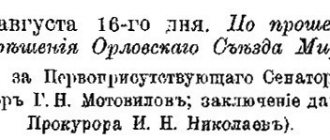Procedural position of the suspect
According to Art. 46 of the Code of Criminal Procedure of the Russian Federation, a suspect is a person :
- against whom a criminal case has been initiated on the grounds and in the manner established by Chapter 20 of the Code of Criminal Procedure of the Russian Federation;
- or who is detained in accordance with Articles 91 and the Code of Criminal Procedure of the Russian Federation;
- or to whom a preventive measure has been applied before charges are filed in accordance with Article 100 of the Code of Criminal Procedure of the Russian Federation;
- or who has been notified of suspicion of committing a crime in the manner established by Article 223.1 of the Code of Criminal Procedure of the Russian Federation.
So the suspect appears
- from the moment a decision is made to initiate criminal proceedings against a specific person who committed a crime in obvious conditions;
- from the moment of his actual detention;
- from the moment a decision is made to apply a preventive measure to him;
- from the moment of delivery of a copy of the notice to him.
The material basis for the appearance of a suspect in criminal proceedings is evidence indicating the possible involvement of a person in the commission of a crime, and the procedural basis - accordingly
- decision to initiate a criminal case,
- protocol for detaining a person as a suspect,
- decision to apply a preventive measure or
- notification of suspicion of committing a crime.
When applying a preventive measure to a person, it should be borne in mind that the filing of charges must follow within 10 days from the moment of its application (including the period of detention), and in criminal cases of terrorism specified in the criminal procedure law - within 30 days. Otherwise, the preventive measure is canceled (Article 100 of the Code of Criminal Procedure of the Russian Federation).
A suspect detained in the manner established by Article 91 of the Code of Criminal Procedure of the Russian Federation must be interrogated no later than 24 hours from the moment of his actual detention,
- when that person is caught committing a crime or immediately after committing it;
- when victims or eyewitnesses point to this person as having committed a crime;
- when obvious traces of a crime are found on this person or his clothing, on him or in his home.
The moment of actual detention is the moment of actual restriction of freedom of movement in accordance with the requirements of the criminal procedural law of a person suspected of committing a crime (clause 15 of Article 5 of the Code of Criminal Procedure of the Russian Federation).
About the detention of a person as a suspect, the investigator or interrogating officer is obliged to notify close or other relatives of the suspect about this or provide the opportunity for such notification to the suspect himself in accordance with Art. 96 Code of Criminal Procedure of the Russian Federation.
When a suspect who is a military serviceman is detained, the command of the military unit is notified, and if the person is a citizen or subject of another state, the embassy or consulate of that state is notified.
If it is necessary to keep the fact of detention secret in the interests of the preliminary investigation, notification with the consent of the prosecutor may not be made, except in cases where the suspect is a minor.
The suspect has the right:
- know what he is suspected of and get:
- a copy of the decision to initiate criminal proceedings against him, or
- a copy of the arrest report, or
- a copy of the decision to apply a preventive measure against him;
- give explanations and testimony regarding the suspicions against him or refuse to give explanations and testimony. If the suspect agrees to testify, he must be warned that his testimony may be used as evidence in a criminal case, including if he subsequently refuses this testimony, with the exception of the case of testifying during pre-trial proceedings in a criminal case in absence of a defense lawyer, not confirmed by the suspect accused in court;
- use the assistance of a defense lawyer from the moment provided for in paragraphs 2 - 3.1 of part three of Article 49 of this Code, and have a meeting with him alone and confidentially until the first interrogation of the suspect;
- from the moment of choosing a preventive measure in the form of detention or house arrest, have meetings without limiting their number and duration with a notary in order to certify the power of attorney for the right to represent the interests of the suspect in the field of business activity. At the same time, it is prohibited to perform notarial acts in relation to property, money and other valuables that may be seized in cases provided for by this Code;
- present evidence;
- file petitions and challenges;
- give evidence and explanations in his native language or a language he speaks;
- use the help of a translator for free;
- get acquainted with the protocols of investigative actions carried out with his participation and submit comments on them;
- participate, with the permission of the investigator or inquiry officer, in investigative actions carried out at his request, the request of his defense attorney or legal representative;
- bring complaints against the actions (inaction) and decisions of the inquiry officer, the head of the inquiry unit, the head of the inquiry body, the inquiry body, the investigator, the prosecutor and the court;
- protect yourself by other means and methods not prohibited by this Code.
In what cases should they be released from custody?
A citizen suspected of a criminal offense cannot be kept in custody indefinitely. There are certain situations when he should be released:
- the requirements of Article 91 of the Code of Criminal Procedure of the Russian Federation were violated (in practice, this means that you were detained without significant evidence that was listed in the paragraph “Detention”);
- there is no longer any reason to believe that it was you who committed the crime (for example, you were detained because of traces of blood on your clothes, but it turned out that this blood was yours, and you cut yourself at home with a kitchen knife);
- there is no reason to take you into custody (this does not mean that all charges against you have been dropped, just that the alleged crime is not that serious and allows the suspect to be released pending trial).
If your case does not fall within the above cases, you may apply for bail and/or bail.
The guarantor undertakes that, upon release from custody, you will appear at the criminal trial scheduled for your case. If the citizen for whom they vouched does not appear at the trial, then his guarantor will not be arrested in his place, but will simply be withdrawn from his account the amount of money that was specified in the surety agreement.
If we are talking about bail, then the detainee must deposit a certain amount into a special court account. If the suspect attends all hearings in his case, the bail will be returned to him after the verdict is pronounced (regardless of what it will be). If the charges are dropped before trial, too.
In some cases, charges against a suspect may be dropped before the trial begins:
- the victim withdrew the accusation - this happens when your ill-wisher is afraid of responsibility for a knowingly false denunciation;
- the injured party and the suspect signed a statement of reconciliation of the parties - for example, if you inflicted a light beating on someone and the victim decided to receive compensation from you without trial;
- the detainee has not reached the age at which he can be held accountable in a criminal case: for minor crimes from 16 years old, for serious crimes - from 14 years old;
- the investigation proved the absence of the event, as well as the corpus delicti;
- The statute of limitations for the crime has expired (from 2 years for minor crimes, up to 15 years for particularly serious crimes).
Knowing these legal nuances, you will be able to be released from custody at least before the trial, and when you are free there are more prospects for avoiding it. If the trial does take place, then you need to study its main features.
Procedural position of the accused
An accused is a person in respect of whom:
- a decision was made to charge him as an accused;
- an indictment was drawn up.
an indictment has been issued;
Defendant is an accused person in whose criminal case a trial has been scheduled.
Convict is an accused person against whom a guilty verdict has been passed.
Acquitted - a defendant who has been acquitted.
Comment
It appears that defendants become convicted or acquitted only after the corresponding sentence enters into legal force. Therefore, these legislative terms are not entirely correct.
The accused has the right to defend his rights and legitimate interests and have sufficient time and opportunity to prepare for the defense.
The accused has the right (Article 47 of the Code of Criminal Procedure of the Russian Federation):
- know what he is accused of and receive a copy of the resolution to initiate a criminal case in which he is charged as an accused;
- receive a copy of the decision to charge him as an accused, a copy of the decision to apply a preventive measure against him, a copy of the indictment, indictment or indictment;
- object to the charge, testify on the charge brought against him or refuse to testify;
- present evidence;
- file petitions and challenges;
- give evidence and explain himself in his native language or a language he speaks;
- use the help of a translator for free;
- use the assistance of a defense lawyer, including free of charge in cases provided for by the Code of Criminal Procedure of the Russian Federation;
- have meetings with the defense lawyer alone and confidentially, including before the first interrogation of the accused, without limiting their number and duration;
- from the moment of choosing a preventive measure in the form of detention or house arrest, have meetings without limiting their number and duration with a notary in order to certify a power of attorney for the right to represent the interests of the accused in the field of business activity (it is prohibited to perform notarial acts in relation to property, funds and other valuables that may be seized);
- participate, with the permission of the investigator, in investigative actions carried out at his request or the request of his defense attorney or legal representative, familiarize himself with the protocols of these actions and submit comments on them;
- get acquainted with the decision on the appointment of a forensic examination, pose questions to the expert and get acquainted with the expert’s conclusion;
- upon completion of the preliminary investigation, get acquainted with all materials of the criminal case and write out any information and in any volume from the criminal case;
- make copies at your own expense from the materials of the criminal case, including using technical means;
- bring complaints against the actions (inaction) and decisions of the inquirer, investigator, prosecutor and the court and take part in their consideration by the court;
- object to the termination of a criminal case on the grounds provided for in part two of Article 27 of the Code of Criminal Procedure of the Russian Federation;
- participate in the trial of a criminal case in the courts of the first, second, cassation and supervisory instances, as well as in the court’s consideration of the issue of choosing a preventive measure in relation to him and in other cases provided for in paragraphs 1-3 and 10 of the second part of Article 29 of the Code of Criminal Procedure of the Russian Federation;
- get acquainted with the minutes of the court hearing and submit comments on it;
- appeal the verdict, ruling, court order and receive copies of the appealed decisions;
- receive copies of complaints and presentations brought in a criminal case and file objections to these complaints and presentations;
- participate in the consideration of issues related to the execution of the sentence;
- defend yourself by other means and methods not prohibited by the Code of Criminal Procedure of the Russian Federation.
The participation of a defense attorney or legal representative of the accused in a criminal case does not serve as a basis for limiting any of the rights of the accused.
Art. 52 of the Code of Criminal Procedure of the Russian Federation establishes that a suspect or accused has the right at any time during criminal proceedings to refuse the assistance of a defense lawyer. Such refusal is allowed only at the initiative of the suspect or accused. The refusal of a defense attorney must be stated in writing. If the refusal of a defense attorney is declared during an investigative action, then a note about this is made in the protocol of this investigative action.
Refusal from a defense lawyer is not obligatory for the inquiry officer, investigator and the court.
Refusal of a defense attorney does not deprive the suspect or accused of the right to subsequently apply for admission of a defense attorney to participate in criminal proceedings. The admission of a defense lawyer does not entail a repetition of procedural actions that have already been carried out at that time.
The material basis for the appearance of the accused in a criminal trial is evidence sufficient to charge a person with committing a crime, and the procedural basis is the presence in the materials of the criminal case of one of the documents:
- decisions to bring a person as an accused - during the investigation of a criminal case in the form of a preliminary investigation;
- indictment - when investigating a criminal case in the form of an independent inquiry.
The procedural statuses of the suspect and the accused are close to each other due to the fact that these persons, according to preliminary data and conclusions, committed a crime, and therefore they are subject to criminal prosecution.
It must be borne in mind that the suspect is a short-term participant in criminal proceedings. In this capacity, he can exist under certain conditions specified in the criminal procedure law - up to 30 days (maximum).
Unlike the suspect, the accused is one of the main participants in criminal proceedings, the criminal case on whose charges is considered in court proceedings. Due to this circumstance, the criminal procedural status of the accused (or defendant) is much broader and more voluminous than the procedural status of the suspect.
The suspect and accused are obliged to:
- appear before state bodies when called by their officials, if they are not in specialized institutions;
- comply with the conditions of the chosen preventive measure, if this preventive measure is not related to the placement of these persons in a special (specialized) institution (Article 102 of the Code of Criminal Procedure of the Russian Federation, etc.);
- be subject to investigative and judicial examination (Article 179 of the Code of Criminal Procedure of the Russian Federation);
- submit samples for comparative research (Article 202 of the Code of Criminal Procedure of the Russian Federation);
- be subject to expert research (Article 195 of the Code of Criminal Procedure of the Russian Federation, etc.), etc.
Of course, the scope of the responsibilities of the accused is much broader, since he takes part, unlike the suspect, in the trial as a defendant.
In particular, he is obliged to maintain order in the court hearing (Article 258 of the Code of Criminal Procedure of the Russian Federation), not to violate the rules of the trial (Article 257 of the Code of Criminal Procedure of the Russian Federation), etc.
The right to provide evidence in the case
Article 46 in paragraph 4, part 4 gives the suspect the right to provide evidence. It can be implemented in reality by giving evidence or providing the investigative authorities or the prosecutor with material items that are directly related to the case. These can be various documents, objects, audio and video materials, etc. Note that other participants in legal proceedings under the Code of Criminal Procedure also have this right.
Procedural position of the defender
The legitimate interests of the suspect and accused are represented by their defenders, whose participation in criminal proceedings is one of the criminal procedural guarantees of ensuring their rights, freedoms and legitimate interests.
In addition, in criminal cases of crimes committed by minors, their legal representatives are involved in mandatory participation in the criminal case (Article 48 of the Code of Criminal Procedure of the Russian Federation).
The participation of a defense attorney or legal representative in a criminal case does not serve as a basis for restricting any right of the accused.
Defender (Article 49 of the Code of Criminal Procedure of the Russian Federation) is a person who, in accordance with the procedure established by this Code, protects the rights and interests of suspects and accused and provides them with legal assistance in criminal proceedings.
Otherwise: Defender is a person with a higher legal education who has entered into an agreement with a client to provide legal assistance to a suspect or accused (defendant, convicted or acquitted) and is allowed to participate in a criminal case to ensure the rights, freedoms and legitimate interests of the client.
The following are allowed as defenders:
- lawyers;
- one of the close relatives of the accused or another person for whose admission the accused applies (by determination or court order, along with a lawyer);
- one of the close relatives of the accused or another person for whose admission the accused applies (by determination or court order, in proceedings before the magistrate, the specified person is admitted instead of a lawyer).
See also “The procedure for appointing lawyers as defense attorneys in criminal proceedings” (approved by the decision of the Council of the FPA of the Russian Federation dated October 5, 2017, protocol No. 5)
A defense attorney participates in a criminal case:
- from the moment a decision is made to charge a person as an accused;
- from the moment of initiation of a criminal case against a specific person;
- from the moment of actual detention of a person suspected of committing a crime, in the cases: a) provided for in Articles 91 and the Code of Criminal Procedure of the Russian Federation; b) application to him in accordance with Article 100 of the Criminal Procedure Code of the Russian Federation of a preventive measure in the form of detention;
- from the moment of delivery of a notification of suspicion of committing a crime in the manner established by Article 223.1 of the Code of Criminal Procedure of the Russian Federation;
- from the moment a decision to order a forensic psychiatric examination is announced to a person suspected of committing a crime;
- from the moment of the beginning of implementation of other measures of procedural coercion or other procedural actions affecting the rights and freedoms of a person suspected of committing a crime;
- from the moment of the commencement of procedural actions affecting the rights and freedoms of the person in respect of whom the report of a crime is being verified in the manner prescribed by Article 144 of the Code of Criminal Procedure of the Russian Federation.
A lawyer is allowed to participate in a criminal case as a defense attorney upon presentation of a lawyer's certificate and a warrant.
If it is necessary to obtain the consent of the suspect or accused for the participation of a lawyer in a criminal case, before entering into a criminal case, the lawyer is given a meeting with the suspect or accused upon presentation of a lawyer’s identification and a warrant.
If a defense attorney participates in criminal proceedings, the materials of which contain information constituting a state secret, and does not have appropriate access to this information, he is required to sign a non-disclosure agreement.
The same person cannot be the defense attorney of two suspects or accused if the interests of one of them contradict the interests of the other.
A lawyer does not have the right to refuse to undertake the defense of a suspect or accused.
As one of the additional guarantees for certain categories of suspects and accused, the criminal procedure law provided for the mandatory participation of a defense lawyer (Article 51 of the Code of Criminal Procedure of the Russian Federation) in criminal cases in which:
- the suspect or accused did not refuse a defense lawyer in the manner established by Article 52 of the Code of Criminal Procedure of the Russian Federation;
- the suspect or accused is a minor;
- the suspect or accused, due to physical or mental disabilities, cannot independently exercise his right to defense;
- the trial is carried out in the manner prescribed by part five of Article 247 of the Code of Criminal Procedure of the Russian Federation;
- the suspect or accused does not speak the language in which the criminal proceedings are being conducted;
- a person is accused of committing a crime for which a sentence of imprisonment for a term of over fifteen years, life imprisonment or the death penalty may be imposed;
- a criminal case is subject to trial by a jury;
- the suspect filed a petition for an investigation in a criminal case in an abbreviated form in the manner established by Chapter 32.1 of the Code of Criminal Procedure of the Russian Federation.
the accused filed a petition to consider the criminal case in the manner established by Chapter 40 of the Code of Criminal Procedure of the Russian Federation (in a special order);
According to Art. 50 of the Code of Criminal Procedure of the Russian Federation, the defense attorney is invited to participate in the case by the suspect, the accused, their legal representatives, as well as other persons on behalf of or with the consent of these persons.
In this case, the interests of the suspect or accused may be represented by several defense attorneys.
At the request of the suspect or accused, the participation of a defense attorney is ensured by the inquiry officer, investigator or court.
If a lawyer participates in a preliminary investigation or trial by appointment of an inquirer, investigator or court, the costs of remunerating his labor are compensated from the federal budget (see the Procedure for calculating the remuneration of a lawyer participating as a defense attorney in criminal proceedings by appointment of authorities inquiry, preliminary investigation bodies or court, depending on the complexity of the criminal case, approved by order of the Ministry of Justice of the Russian Federation and the Ministry of Finance of the Russian Federation dated September 5, 2012 N 174/122n).
The admission of a defense attorney to criminal proceedings in accordance with a subsequent petition of the suspect or accused does not entail a repetition of criminal procedural actions that have already been carried out by that moment (Article 52 of the Code of Criminal Procedure of the Russian Federation).
The right to file petitions and challenges
In jurisprudence, a petition is an official request, a proposal for something. The suspect can submit petitions not only for the collection of new or additional evidence by the investigative authorities or for verification of versions that would exonerate him, but also demands for the termination of criminal prosecution against him, as well as the opportunity to familiarize himself with any procedural documents, acts, etc. etc. In any case, it is always subject to consideration by the investigator. A suspect or his defense attorney may never be denied the right to conduct investigative actions, including questioning witnesses or conducting a forensic examination, if the circumstances sought to be established are significant for the given criminal case.
A challenge, or, in other words, an application for the removal of any participant in the process from the case, can be filed against a defense lawyer, specialist, expert, translator, judge, prosecutor, inquiry officer, investigator due to circumstances that exclude their further participation in the proceedings.
Right to notify relatives
At the request of the suspect, within 12 hours from the moment of detention, the investigator, interrogating officer or prosecutor must notify one of his close relatives (in their absence, other persons) or provide such an opportunity to him. If the suspect is a national or citizen of another country, this information should be reported to the embassy (consulate) of that state.
There are exceptions to all rules. And in this case too. These rights of a suspect (adult) may be violated if it is necessary to keep the fact of detention secret in the interests of the preliminary investigation. This is possible only with the permission of the prosecutor.
Right to file a complaint
Both the suspect and the accused have the right to draw up and file a complaint against the inaction or actions and decisions of the judicial authorities, investigators and interrogators, and the prosecutor. In this case, criminal law norms 125 and 126 have a security function in favor of these persons. They reflect the procedure for filing a complaint, as well as the procedure for its consideration by authorized bodies, which provides for a mandatory system for giving a response (notification of the results of the consideration and the decision made).






